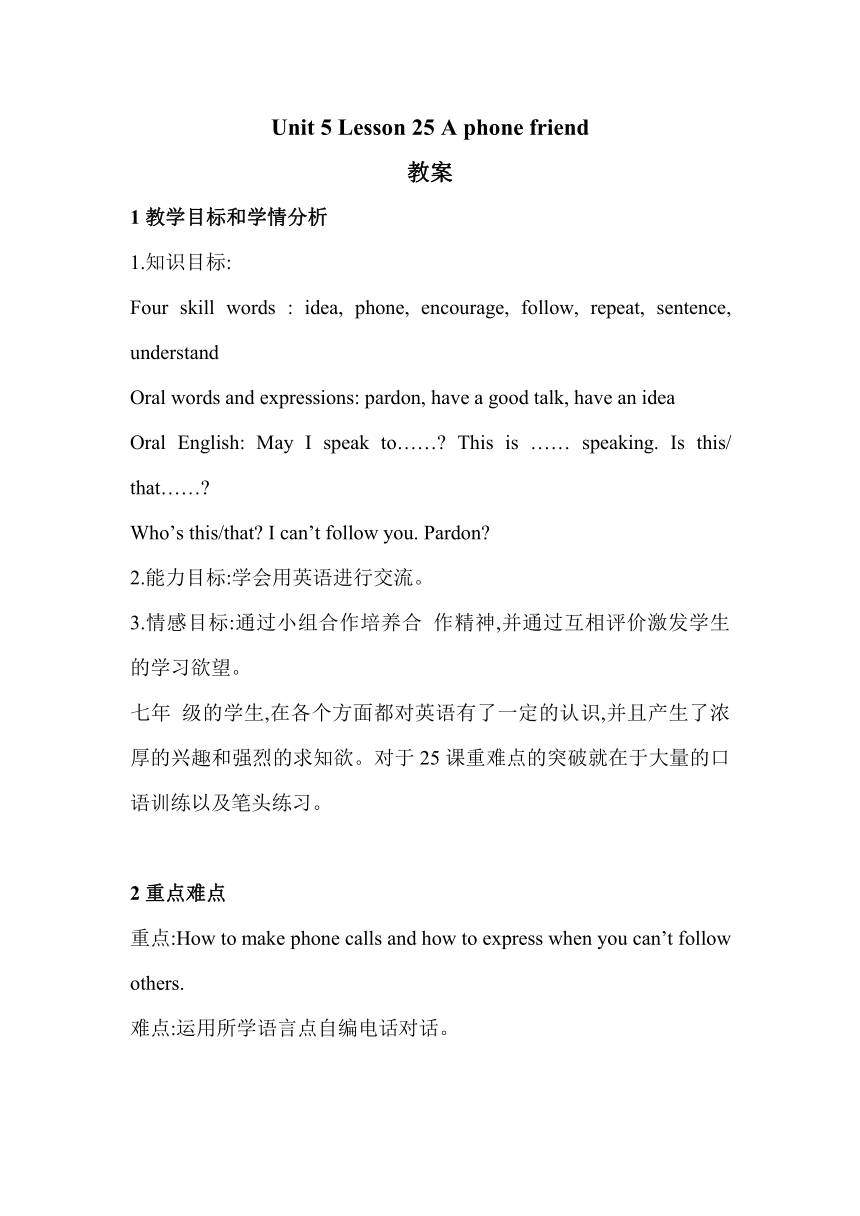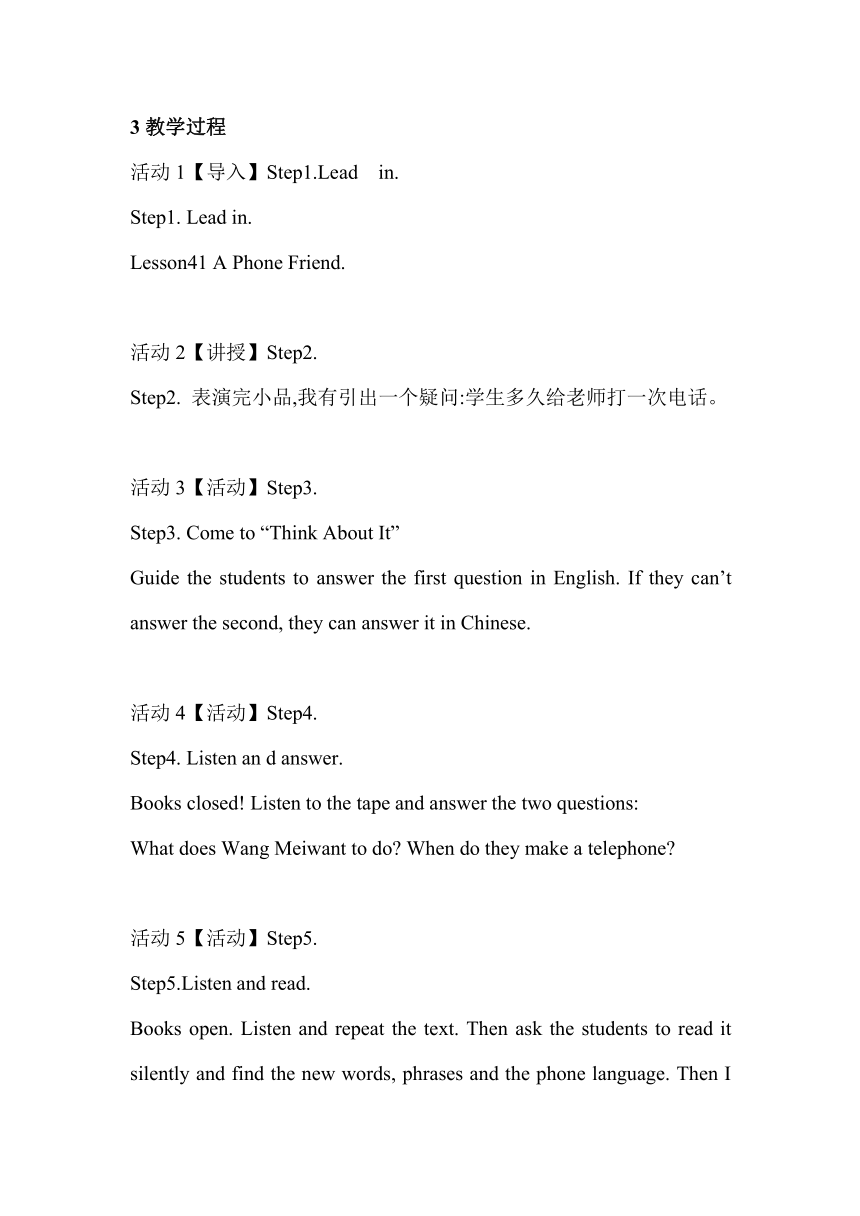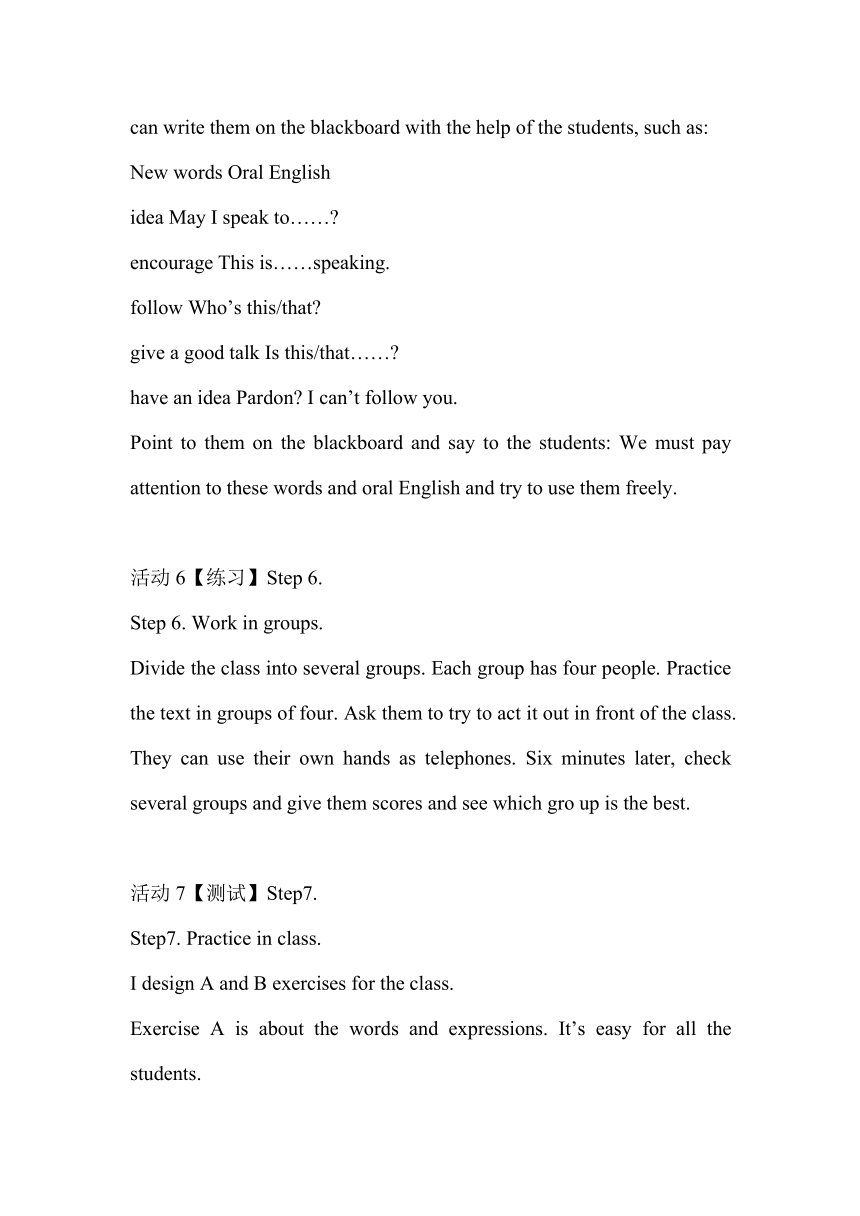Unit 5 Lesson 25 A phone friend 教案
文档属性
| 名称 | Unit 5 Lesson 25 A phone friend 教案 |

|
|
| 格式 | zip | ||
| 文件大小 | 119.4KB | ||
| 资源类型 | 教案 | ||
| 版本资源 | 冀教版 | ||
| 科目 | 英语 | ||
| 更新时间 | 2017-03-03 00:00:00 | ||
图片预览



文档简介
Unit
5
Lesson
25
A
phone
friend
教案
1教学目标和学情分析
1.知识目标:
Four
skill
words
:
idea,
phone,
encourage,
follow,
repeat,
sentence,
understand
Oral
words
and
expressions:
pardon,
have
a
good
talk,
have
an
idea
Oral
English:
May
I
speak
to……
This
is
……
speaking.
Is
this/
that……
Who’s
this/that
I
can’t
follow
you.
Pardon
2.能力目标:学会用英语进行交流。
3.情感目标:通过小组合作培养合
作精神,并通过互相评价激发学生的学习欲望。
七年
级的学生,在各个方面都对英语有了一定的认识,并且产生了浓厚的兴趣和强烈的求知欲。对于25课重难点的突破就在于大量的口语训练以及笔头练习。
2重点难点
重点:How
to
make
phone
calls
and
how
to
express
when
you
can’t
follow
others.
难点:运用所学语言点自编电话对话。
3教学过程
活动1【导入】Step1.Lead in.
Step1.
Lead
in.
Lesson41
A
Phone
Friend.
活动2【讲授】Step2.
Step2.
表演完小品,我有引出一个疑问:学生多久给老师打一次电话。
活动3【活动】Step3.
Step3.
Come
to
“Think
About
It”
Guide
the
students
to
answer
the
first
question
in
English.
If
they
can’t
answer
the
second,
they
can
answer
it
in
Chinese.
活动4【活动】Step4.
Step4.
Listen
an
d
answer.
Books
closed!
Listen
to
the
tape
and
answer
the
two
questions:
What
does
Wang
Meiwant
to
do
When
do
they
make
a
telephone
活动5【活动】Step5.
Step5.Listen
and
read.
Books
open.
Listen
and
repeat
the
text.
Then
ask
the
students
to
read
it
silently
and
find
the
new
words,
phrases
and
the
phone
language.
Then
I
can
write
them
on
the
blackboard
with
the
help
of
the
students,
such
as:
New
words
Oral
English
idea
May
I
speak
to……
encourage
This
is……speaking.
follow
Who’s
this/that
give
a
good
talk
Is
this/that……
have
an
idea
Pardon
I
can’t
follow
you.
Point
to
them
on
the
blackboard
and
say
to
the
students:
We
must
pay
attention
to
these
words
and
oral
English
and
try
to
use
them
freely.
活动6【练习】Step
6.
Step
6.
Work
in
groups.
Divide
the
class
into
several
groups.
Each
group
has
four
people.
Practice
the
text
in
groups
of
four.
Ask
them
to
try
to
act
it
out
in
front
of
the
class.
They
can
use
their
own
hands
as
telephones.
Six
minutes
later,
check
several
groups
and
give
them
scores
and
see
which
gro
up
is
the
best.
活动7【测试】Step7.
Step7.
Practice
in
class.
I
design
A
and
B
exercises
for
the
class.
Exercise
A
is
about
the
words
and
expressions.
It’s
easy
for
all
the
students.
Exercise
B
is
a
dialogue
with
some
blanks.
It’s
a
little
hard
for
several
students.
Ask
them
to
do
the
exercises
by
themselves,
then
check
the
answers
orally
in
class.
Correct
the
mistaken
ones
in
time.
活动8【作业】Step8.
Step8.
Homework:
Must
do:
Make
up
a
dialogue
using
the
phone
language
learned
in
this
lesson.
Choose
to
do:
Rewrite
the
text
into
a
passage.
活动9【活动】教学板书
(一)
self-learning:
1:温故知新:
(1)
I
always
practice
---(learn)English.
(2)They
--
--
--(be
going
to)
visit
their
friends.
(3)This
one
is
–(昂贵的),would
you
like
that
one.
(4)Look
at
the
–(接着的)
examples,
and
then
find
the
answers
by
yourself.
2:互助释义:
(1)
Understand
:v
懂得,理解,其过去式和过去分词均为
understood,
eg:
He
understood
its
meaning
at
last.
(2)
No
problem.
没问题。用来表示同意和愉快的回答请求,也可回答感谢,意为“不客气”eg:---Thank
you
----No
problem.
(3)Could
的用法:
could
用作情态动词,意为“能;可能”是can的过去式,(1)
用来表示过去的能力:She
could
swim
when
she
was
six.
她六岁的时候就会游泳。
a.
表示许可:can和could均可用,但用could
语气更委婉,
eg:
Can/Could
I
come
in
我可以进来吗
b.
表示推测:对现在或将来的推测,can和could均可用,但can
通常只用于否定句或疑问句中,一般不用于肯定句,而could则可用于肯定句、否定句和疑问句,eg:
You
could
be
right.
你可能是对的。
另外:could
还可用于虚拟语气中,
构成could
have
done
结构表示因过去可以做的事情没有做而感到遗憾惋惜,或者
couldn't
have
done
表示过去本不该做的事情而做了感到遗憾懊悔等等。eg:
I
could
have
stopped
them
fighting.
我本来可以阻止他们打架的。
3:探究出招:
(1)
Can
you
---(理解)
what
I
said
to
you.
(2)
Would
you
like
to
help
me
with
my
English
-------(没问题)。
(3)
Can
you
do
it
by
yourself
I
am
very
busy
now.
-------(没问题)。
(4)
She
------
swim
when
she
was
six.
她六岁的时候就会游泳。
(5)You
------be
right.(你可能是正确的)。
(二)展示交流:
小组展示:
Make
a
phone
call
with
your
group,
then
show
it
separately.
(三)拓展提升:
反馈矫正:
(1)
Would
you
like
to
make
friends
with
-------(外国人)
(2)------(能)you
speak
it
loudly.
(3)
I
am
from
------(加拿大),so
I
am
a
-------(加拿大人)。
(4)
Can
you
-------(理解)
me
(5)
You
-------
be
right.
(四)挑战自我:
(1)
She
------
be
a
good
student,
I
guess.
(2)
Can
you
speak
it
------(大声地)
,I
can
not
hear
you
clearly.
5
Lesson
25
A
phone
friend
教案
1教学目标和学情分析
1.知识目标:
Four
skill
words
:
idea,
phone,
encourage,
follow,
repeat,
sentence,
understand
Oral
words
and
expressions:
pardon,
have
a
good
talk,
have
an
idea
Oral
English:
May
I
speak
to……
This
is
……
speaking.
Is
this/
that……
Who’s
this/that
I
can’t
follow
you.
Pardon
2.能力目标:学会用英语进行交流。
3.情感目标:通过小组合作培养合
作精神,并通过互相评价激发学生的学习欲望。
七年
级的学生,在各个方面都对英语有了一定的认识,并且产生了浓厚的兴趣和强烈的求知欲。对于25课重难点的突破就在于大量的口语训练以及笔头练习。
2重点难点
重点:How
to
make
phone
calls
and
how
to
express
when
you
can’t
follow
others.
难点:运用所学语言点自编电话对话。
3教学过程
活动1【导入】Step1.Lead in.
Step1.
Lead
in.
Lesson41
A
Phone
Friend.
活动2【讲授】Step2.
Step2.
表演完小品,我有引出一个疑问:学生多久给老师打一次电话。
活动3【活动】Step3.
Step3.
Come
to
“Think
About
It”
Guide
the
students
to
answer
the
first
question
in
English.
If
they
can’t
answer
the
second,
they
can
answer
it
in
Chinese.
活动4【活动】Step4.
Step4.
Listen
an
d
answer.
Books
closed!
Listen
to
the
tape
and
answer
the
two
questions:
What
does
Wang
Meiwant
to
do
When
do
they
make
a
telephone
活动5【活动】Step5.
Step5.Listen
and
read.
Books
open.
Listen
and
repeat
the
text.
Then
ask
the
students
to
read
it
silently
and
find
the
new
words,
phrases
and
the
phone
language.
Then
I
can
write
them
on
the
blackboard
with
the
help
of
the
students,
such
as:
New
words
Oral
English
idea
May
I
speak
to……
encourage
This
is……speaking.
follow
Who’s
this/that
give
a
good
talk
Is
this/that……
have
an
idea
Pardon
I
can’t
follow
you.
Point
to
them
on
the
blackboard
and
say
to
the
students:
We
must
pay
attention
to
these
words
and
oral
English
and
try
to
use
them
freely.
活动6【练习】Step
6.
Step
6.
Work
in
groups.
Divide
the
class
into
several
groups.
Each
group
has
four
people.
Practice
the
text
in
groups
of
four.
Ask
them
to
try
to
act
it
out
in
front
of
the
class.
They
can
use
their
own
hands
as
telephones.
Six
minutes
later,
check
several
groups
and
give
them
scores
and
see
which
gro
up
is
the
best.
活动7【测试】Step7.
Step7.
Practice
in
class.
I
design
A
and
B
exercises
for
the
class.
Exercise
A
is
about
the
words
and
expressions.
It’s
easy
for
all
the
students.
Exercise
B
is
a
dialogue
with
some
blanks.
It’s
a
little
hard
for
several
students.
Ask
them
to
do
the
exercises
by
themselves,
then
check
the
answers
orally
in
class.
Correct
the
mistaken
ones
in
time.
活动8【作业】Step8.
Step8.
Homework:
Must
do:
Make
up
a
dialogue
using
the
phone
language
learned
in
this
lesson.
Choose
to
do:
Rewrite
the
text
into
a
passage.
活动9【活动】教学板书
(一)
self-learning:
1:温故知新:
(1)
I
always
practice
---(learn)English.
(2)They
--
--
--(be
going
to)
visit
their
friends.
(3)This
one
is
–(昂贵的),would
you
like
that
one.
(4)Look
at
the
–(接着的)
examples,
and
then
find
the
answers
by
yourself.
2:互助释义:
(1)
Understand
:v
懂得,理解,其过去式和过去分词均为
understood,
eg:
He
understood
its
meaning
at
last.
(2)
No
problem.
没问题。用来表示同意和愉快的回答请求,也可回答感谢,意为“不客气”eg:---Thank
you
----No
problem.
(3)Could
的用法:
could
用作情态动词,意为“能;可能”是can的过去式,(1)
用来表示过去的能力:She
could
swim
when
she
was
six.
她六岁的时候就会游泳。
a.
表示许可:can和could均可用,但用could
语气更委婉,
eg:
Can/Could
I
come
in
我可以进来吗
b.
表示推测:对现在或将来的推测,can和could均可用,但can
通常只用于否定句或疑问句中,一般不用于肯定句,而could则可用于肯定句、否定句和疑问句,eg:
You
could
be
right.
你可能是对的。
另外:could
还可用于虚拟语气中,
构成could
have
done
结构表示因过去可以做的事情没有做而感到遗憾惋惜,或者
couldn't
have
done
表示过去本不该做的事情而做了感到遗憾懊悔等等。eg:
I
could
have
stopped
them
fighting.
我本来可以阻止他们打架的。
3:探究出招:
(1)
Can
you
---(理解)
what
I
said
to
you.
(2)
Would
you
like
to
help
me
with
my
English
-------(没问题)。
(3)
Can
you
do
it
by
yourself
I
am
very
busy
now.
-------(没问题)。
(4)
She
------
swim
when
she
was
six.
她六岁的时候就会游泳。
(5)You
------be
right.(你可能是正确的)。
(二)展示交流:
小组展示:
Make
a
phone
call
with
your
group,
then
show
it
separately.
(三)拓展提升:
反馈矫正:
(1)
Would
you
like
to
make
friends
with
-------(外国人)
(2)------(能)you
speak
it
loudly.
(3)
I
am
from
------(加拿大),so
I
am
a
-------(加拿大人)。
(4)
Can
you
-------(理解)
me
(5)
You
-------
be
right.
(四)挑战自我:
(1)
She
------
be
a
good
student,
I
guess.
(2)
Can
you
speak
it
------(大声地)
,I
can
not
hear
you
clearly.
同课章节目录
- Unit 1 A Trip to the Silk Road
- Lesson 1 A Trip to China
- Lesson 2 Meet You in Beijing
- Lesson 3 A Visit to Xi'an
- Lesson 4 A Visit to Lanzhou
- Lesson 5 Another Stop along the Silk Road
- Lesson 6 Jenny's Diary
- Unit 2 It's Show Time!
- Lesson 7 What's Your Project about?
- Lesson 8 Marco Polo and the Silk Road
- Lesson 9 Danny's School Project
- Lesson 10 Music and Dance
- Lesson 11 Food in China
- Lesson 12 A Blog about the Silk Road
- Unit 3 School Life
- Lesson 13 How Is School Going?
- Lesson 14 Jenny's School Life
- Lesson 15 Making a Difference
- Lesson 16 We Are with You!
- Lesson 17 School Science Fai
- Lesson 18 Teaching in China
- Unit 4 After-School Activities
- Lesson 19 A Dinner Date
- Lesson 20 Join Our Club!
- Lesson 21 What Is Your Club Type?
- Lesson 22 Big Plans for the Weekend
- Lesson 23 A Weekend with Grandma
- Lesson 24 How was Your Weekend?
- Unit 5 I Love Learning English!
- Lesson 25 A Phone Friend
- Lesson 26 Online Phone Calls
- Lesson 27 Amazing English
- Lesson 28 How Do I Learn English?
- Lesson 29 A Door to the World
- Lesson 30 Writing an E-mail in English
- Unit 6 Seasons
- Lesson 31 What Strange Weather!
- Lesson 32 I Can't Wait for Winter!
- Lesson 33 Kim's Favourite Season
- Lesson 34 Steven's Report
- Lesson 35 Surfing in Sydney
- Lesson 36 Spring in China
- Unit 7 Sports and Good Health
- Lesson 37 You Are What You Eat!
- Lesson 38 Stay Healthy!
- Lesson 39 Danny's Report
- Lesson 40 Move Your Body
- Lesson 41 Were People Healthy Then?
- Lesson 42 Know Yourself
- Unit 8 Summer Holiday Is Coming!
- Lesson 43 Have a Good Summer!
- Lesson 44 Volunteering in Summe
- Lesson 45 Baseball Season
- Lesson 46 Get Ready for Summer Holiday!
- Lesson 47 Summer Plans
- Lesson 48 Li Ming's Summer Holiday
